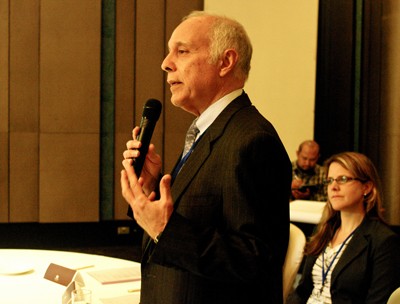
Good morning, all. On behalf of the U.S. Government, I am delighted to have this opportunity to provide some brief opening remarks for this workshop. And I’d like to start by thanking our kind co-hosts and colleagues from TRAFFIC and the World Customs Organization.
I understand we have participants here who are engaged in a broad range of the transportation and logistics industries, from airlines, courier, baggage handling, and shipping, to industry associations, port authorities, customs officers, and more - including representatives from several different parts of the world. And obviously that’s what it will take to address this very serious challenge: close and effective collaboration and engagement from a broad range of stakeholders. Thank you all for your engagement, and your active participation in this workshop.
As you all know, wildlife trafficking is a logistics and transport-intensive activity. Traffickers of wildlife and wildlife products have discrete smuggling methods, networks, routes and markets. And evidence indicates that legitimate transportation and distribution supply chains are also being used to traffic illegal wildlife. For example, ivory is most often hidden in shipping containers, while rhino horn is usually trafficked by air passengers.
Given the heavy reliance of traffickers on legal transportation networks, companies are increasingly exposed to risk, and often inadvertently can become a key link within illegal wildlife chains. There may also be increased business and reputational risk that goes along with unknowingly carrying illicit goods -- for example, increased international media attention from seizures, and increased costs from interruptions in the flow of goods and services.
The private sector transportation and logistics companies can play an important role by complementing and bolstering actions taken by governments and NGOs. Through this collaborative action planning workshop, we hope to learn from your expertise; share best practices; and gain a better understanding of the impacts and business risks associated with the illegal wildlife trade. We also hope to identify, jointly, more effective solutions.
The United States Government seeks to collaborate to help develop solutions and identify practical opportunities to prevent trafficking. In fact, several elements of the U.S. government based here in Bangkok are engaged in supporting these important efforts, through provision of training, technical assistance, direct engagement with stakeholders in the public and private sectors, and with important project activities.
Our commitment is strong, and we are delighted to announce that USAID is seeking expressions of interest for a potential new partnership focused on “Reducing Opportunities for Unlawful Transport of Endangered Species,” called ROUTES. Through this call, we hope to catalyze innovative solutions and creative partnerships with the transport and logistics industry, to reduce vulnerability of transport supply chains to the illegal wildlife trade.
The United States Government will work with a diversity of partners to help put into practice better ideas and solutions to address wildlife trafficking, and we hope there will be several coming out of this workshop. We hope to work together, to turn the tide of the illegal wildlife trade, a challenge that must be addressed with urgency. Wildlife trafficking is literally decimating wild populations of flora and fauna, around the world. New partnerships between government, civil society and industry will need to be developed, to improve operational efficiency, reduce risks, strengthen social and economic development, and convey broader benefits - including, of course, for nature and wildlife.
Thank you.







Comment
Make a general inquiry or suggest an improvement.